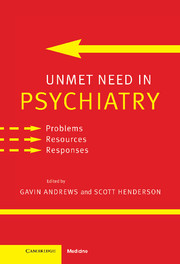Book contents
- Frontmatter
- Contents
- List of Contributors
- Preface
- Part I Unmet need: defining the problem
- 1 Assessing needs for psychiatric services
- 2 Unmet need: a challenge for governments
- 3 Meeting the unmet need with disease management
- Part II Unmet need: general problems and solutions
- Part III Unmet need: people with specific disorders
- Part IV Unmet need: specific issues
- Part V Unmet need: conclusion
- Index
3 - Meeting the unmet need with disease management
from Part I - Unmet need: defining the problem
Published online by Cambridge University Press: 21 August 2009
- Frontmatter
- Contents
- List of Contributors
- Preface
- Part I Unmet need: defining the problem
- 1 Assessing needs for psychiatric services
- 2 Unmet need: a challenge for governments
- 3 Meeting the unmet need with disease management
- Part II Unmet need: general problems and solutions
- Part III Unmet need: people with specific disorders
- Part IV Unmet need: specific issues
- Part V Unmet need: conclusion
- Index
Summary
Half to three-quarters of the people identified in epidemiological surveys as meeting criteria for a mental disorder do not report receiving treatment. All mental health professionals are busy and there is usually no prospect of an increase in the available labor force. So what should be done? One view is that scarce health resources should be offered to those who are sickest. The techniques for ranking diseases by the burden of mortality and morbidity they generate are well advanced. However, if we focus on the sickest, we risk running out of resources before we maximize any health gains. Wouldn't it be better to identify the diagnosis/treatment pairings that offer the greatest prospect of reducing mortality and morbidity, that is, the greatest health gain, and deploy our resources accordingly? This would certainly impact on health, but what if maximizing health gains means that some severely ill people must go untreated? We must develop a mechanism to prioritize the delivery of health care to maximize the attainable health gains, while still attending to the chronically sick. Yet it is this balance between care and cure, between equity and efficiency, that is so difficult to achieve. Thankfully, there is a further alternative to this scenario of chronic shortage. We could supplement the expensive medical model with a public health disease management approach to emphasize primary prevention, community education, and patient self-help by using books and the newer interactive technologies via the automated telephone and Internet. Sadly for doctors, but fortunately for sufferers, the doctor–patient relationship is not essential if one has effective and proven treatments.
Keywords
- Type
- Chapter
- Information
- Unmet Need in PsychiatryProblems, Resources, Responses, pp. 11 - 36Publisher: Cambridge University PressPrint publication year: 2000
- 26
- Cited by



